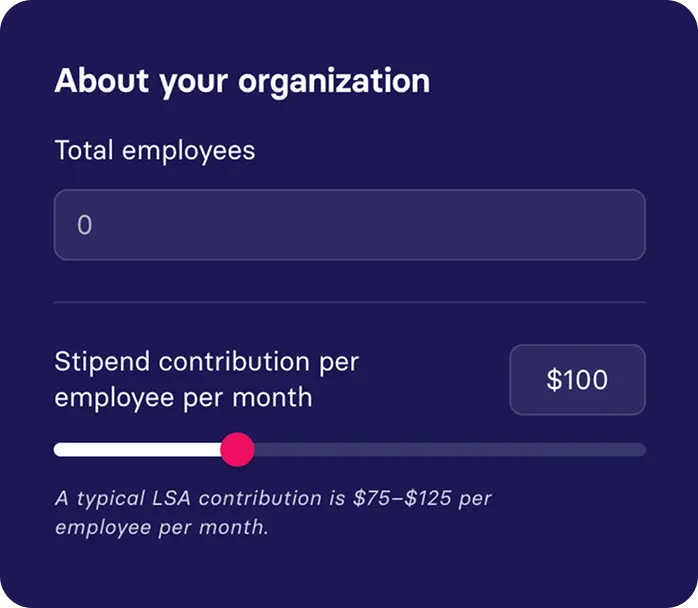In this post
Lorem ipsum dolor sit amet
Lorem ipsum dolor sit amet
No employee is tied to their hometown forever. Many employees will either choose, be offered, or even be required to move further afield as they progress in their careers. The following examples illustrate when someone might move to a different town, state, or even country due to a job:
- A remote employee might be expected to move closer to the company’s headquarters if the employer triggers a return to office mandate
- A college graduate could be recruited by an employer in a different state
- An employee might be asked to move internally to a new branch location
- An employee might have personal reasons for requesting an internal move to a different office
- An international hire might be offered a company-sponsored visa and relocation package for themselves and their family
In each of these situations, the move will likely be costly for the employee. This guide discusses how relocation stipends can ease the stress and financial burden associated with moving house and starting a new job at the same time.
What is a relocation stipend?
A relocation stipend is a monetary benefit provided by an employer to assist new hires or employees with the expense of moving to a new location for work. This benefit is also known as a relocation allowance, relocation bonus, or relocation package and is ultimately designed to make the move easy and affordable for the recipient.
How do relocation stipends work?
Relocation stipends aren’t mandatory, so there’s no fixed sum an employer must provide or process to follow. Some companies will create a relocation policy outlining what the employee can use their stipend for, with eligible spending categories for airfares, professional movers, and temporary accommodation, etc. Other companies will provide a custom stipend based on the employee’s actual move costs.
Are relocation stipends negotiable?
Some degree of negotiation between the employee and the employer may occur; for example, an employer may be willing to pay for professional moving services but not for the packing and unpacking add-on.
Are relocation stipends taxable?
Relocation stipends are typically viewed as taxable income, meaning employers are expected to withhold taxes associated with them. The only exception is if the stipend is used directly for qualified moving expenses, such as transportation costs. In that case, the employee may claim a tax exemption on those specific costs. The employer and employee must consult with a tax professional for guidance on their situation.
What are the benefits of offering relocation stipends?
Companies willing to offer relocation support unlock a wealth of benefits for the employer and the employee:
- Employers can attract exceptional talent from different regions or countries
- Employers can offset the cost of recruiting a new hire by relocating an existing team member elsewhere
- Employees can settle quickly into a new location and their new role without the distraction of financial pressures
What could a relocation stipend pay for?
Relocation stipends are entirely customizable depending on what the employer is willing to pay for and the complexity of a move. For example, an employee relocating an hour away across state lines will have entirely different needs to someone moving continents to a location where their spouse and children don’t speak the language. To accommodate your specific needs, build your relocation stipend around some or all of the following categories:
- Moving expenses: Professional moving services, packing and unpacking, and storage fees
- Travel expenses: Airfare or train tickets for employees and their family members, including transportation costs for vehicles and pets
- Temporary accommodation: Hotel stays, short-term rentals, or corporate housing for the employee before finding a permanent residence
- Home buying and selling: Reimbursement for selling an existing home or purchasing a new one, including closing costs and real estate fees
- Childcare and family support: Assistance with finding childcare or schools in the new location and support for spouses who may need to quit their jobs to relocate
- Spousal support: Help with finding a job or paying for career counseling services for the employee’s spouse
- Cultural orientation: Assistance with navigating cultural differences, language classes, and other resources to help the employee and their family adjust to the new location
- Visa sponsorship: Reimbursement for costs associated with obtaining a work visa or permanent residency in the new location
- Cost of living adjustments: Additional compensation to help offset higher living expenses in the new location. For example, if an employee has been living in a 5-bed detached home in the Midwest and wants a similar-sized property in California, their living costs will significantly increase. A relocation stipend can help bridge the gap and make this move feasible for the employee.
- Payback clauses: Added into a relocation stipend agreement, any employee who leaves the company within a certain period after receiving the reimbursement may be required to repay all or a portion of the stipend amount
4 alternative ways to fund employee relocations
Relocation stipends are convenient, compliant, and affordable for the companies who offer them and the workers who receive them. But there are some alternatives to explore:
In-house relocation services
For enterprise companies with offices in multiple countries, global relocation is likely part and parcel of their operations. Employees may be dispatched to satellite offices in new locations to establish a business presence there, or executive talent may move regularly from one job posting to another as they climb the corporate ladder.
Companies regularly relocating their people may justify investing in their in-house relocation team to manage the process. Joe Noori, a global mobility professional with a 22+-year career working for companies like Sirva and BGRS, explains the pros and cons of this approach:
“Companies that keep their mobility support and teams in-house can control the messaging around their relocation policies, how they are delivered, and how things like exceptions and policy deviations are managed. The relocating employees can turn to trusted colleagues directly who remain the point of contact to answer any questions and help with tasks like onboarding. As an organization, you also remain in full control of which suppliers you liaise and contract with on the ground in the various locations where support is needed. Of course, all of this is an administrative burden. These key tasks are typically completed by HR teams, who likely have many other elements to their roles, such as payroll, total rewards, etc. Organizations need to ask themselves: ‘Is this the best use of time for these key individuals?’”
Third-party relocation providers
When companies lack the resources or expertise to manage their own relocation services, they might pay third-party relocation providers either to handle the entire process or to plug the gaps in their in-house offering. Joe Noori describes what this outsourced approach can look like:
“Third-party providers offer the opportunity for organizations to outsource some or all of their relocation tasks and free up time for their HR professionals while retaining key areas like policy design and ownership. Outsourced providers are typically set up with teams providing consistent support regardless of location. They can remove some of the admin by taking ownership of key areas such as expense processing and supplier management. These companies will have a wide network, leveraging local suppliers on the ground to offer support around all the typical activities you’d expect when relocating, such as home or school-finding.”
Lump sum to employees
If you’re focused on funding rather than supporting employee moves, offering a “relocation allowance” is another option. This is a lump sum added to the employee’s starting salary. The employees can choose how they wish to spend the funds, and there’s no need for them to submit receipts or expense reports.
The downside of simply adding a relocation allowance to an employee’s paycheck is that employers don’t have much way to know how employees are spending the money. Once the money is delivered to employees, there’s no way to substantiate whether employees use it for its intended purpose.
Relocation reimbursements
Reimbursements are an admin-intensive alternative to stipends. They typically require employees to front their relocation costs and then provide evidence to their employer for reimbursement.
Reimbursements are uncommon in the relocation sphere as many employees won’t be able to cover their moving expenses upfront and then wait for a refund. This option is not considered equitable, as not all employees may have access to the upfront costs of relocation or be able to wait for reimbursement. Employers might be placing unnecessary stress on their employees by choosing this option.
4 real-life relocation package examples
Let’s take a look at some real-life examples of how companies handle their employee relocation in the wild:
Netflix
Netflix uses its Work Life Philosophy page to highlight why the company invests in relocation support and its available resources. Although it doesn’t mention any specific budgets or stipends, Netflix states:
“We are not bound by policies and restrictions of where great talent is located. When Netflix moves you for your new role, from one city, country, to another, we have a Talent Mobility team dedicated to supporting you and your family. We understand that relocating can be multi-faceted and that there is a lot to consider. Our goal is to remove distractions by providing inclusive, fair, and meaningful benefits, which allow our stunning colleagues to settle quickly and focus on their role at Netflix.”
Business Insider recently published an as-told-to essay with a recent tech grad who received job offers from companies including Google and Meta. As they weighed up the pros and cons of each employer, the grad mentioned that Google’s $13,000 cash stipend for relocation was a deciding factor. In comparison, Meta was only willing to offer “cash in lieu of some of the services they offered, like employment housing for 30 days. The recruiter told me I could only cash out up to $5,000.”
Meta
Despite what the employee above was offered, other Meta employees report more generous relocation offerings as part of the Core Plus package. One person was quoted “$16k plus budget to reimburse any move-related expense; I can reimburse a flight home to visit family one time ($10k if single), 1 month at a furnished apartment near the office, the option to use their full-service movers or $15k cash (pre-tax), a concierge service, e.g., people to help you find a permanent home, realtor recommendations, neighborhood tours, and a bunch of other fringe things like they’ll ship your car or pets if you need.”
Apple
Apple is an example of a company forcing relocation for some workers. The employer offered its employees a $7,000 relocation stipend to move from San Diego to Austin, Texas, as part of a team merger. Anyone unwilling to accept the change would be terminated with four weeks’ severance pay plus a year for every year worked. A majority of San Diegan employees were unwilling to make the move.
Support your employees’ relocation needs with Benepass
Flexibility is key to supporting your people, old or new, with the disruption of relocation from one city, state, or country to the next. Relocation stipends are entirely customizable based on your budget and your requirements.
Here’s how to offer them using the Benepass Lifestyle Spending Account:
- You’ll choose what to offer as part of your relocation stipend. For example, travel expenses, moving expenses, technology, cell phone, and work-from-home setups, wellness and mental health support, etc.
- We’ll code your unique policy into the Benepass platform and Visa card.
- We’ll connect Benepass to your payroll system to automate enrollment for your employees.
- You’ll communicate how your relocation stipend works and invite your new hires or existing employees to join our platform.
Ready to get your employees set up and raring to go in their brand new work location? Book a free Benepass demo today or contact sales@getbenepass.com to connect with a benefits specialist.







